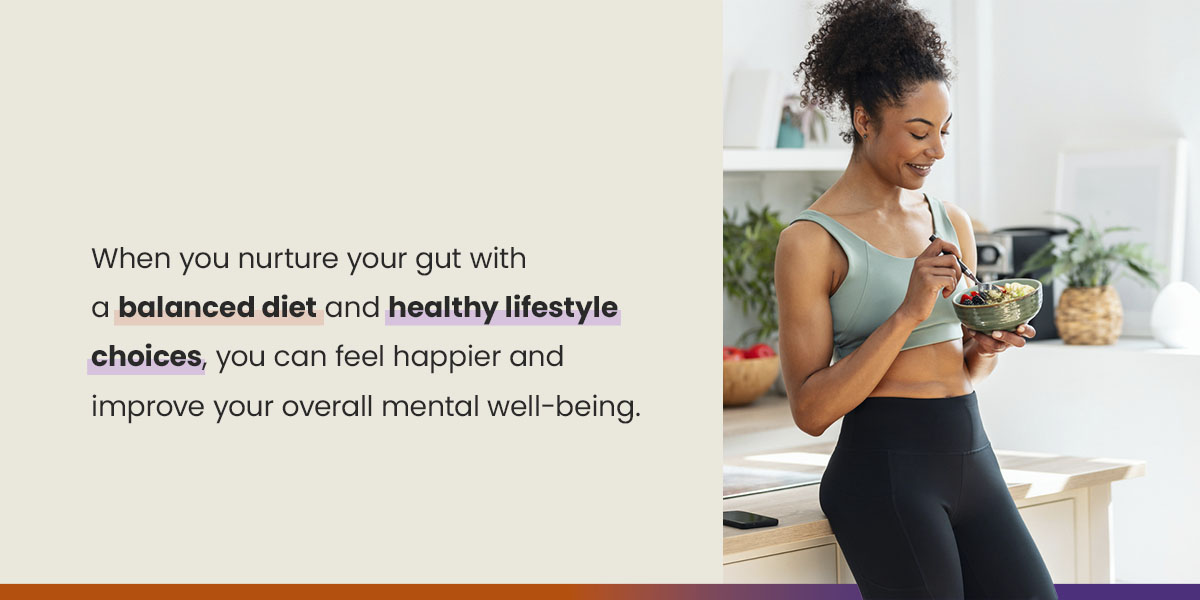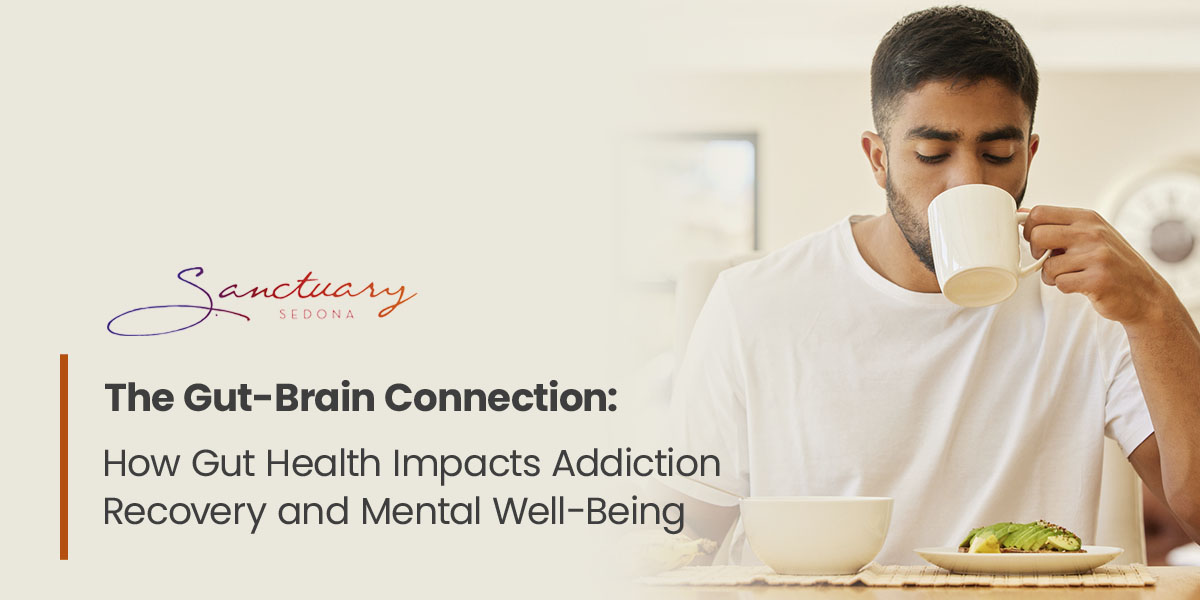Research finds that the health of your gastrointestinal (GI) tract — also known as your gut microbiome — can directly affect your brain chemistry and mood. In fact, there are more nerve cells in your gut than anywhere else in your body outside of the brain. If you’ve ever felt “butterflies in your stomach” when nervous, you’ve experienced this phenomenon in action.
The gut-brain connection offers a powerful pathway to mental wellness and healing. Understanding the link is especially vital when recovering from addiction. Eating gut-friendly foods, for instance, may alleviate feelings of anxiety or depression in the long run and help your body heal. Learn more about the connection and how you can nurture your gut for a lasting recovery.
What Is the Gut-Brain Axis?
The microbiome-gut-brain axis is the two-way communication between the GI tract and the brain. Signals pass both ways between your digestive system and the central nervous system, as well as the endocrine and immune systems. Studies find that the cross talk between your gut and brain might influence your:
- Hunger and satiety
- Food sensitivities and intolerances
- Food preferences and cravings
- Pain sensitivity
- Digestion
- Metabolism
- Mood and behavior
- Stress levels
- Cognitive processes
- Immunity
A major pathway is the vagus nerve, a direct line of communication. The gut microbiome, the vast community of bacteria residing in your gut, also plays a critical role. These microbes produce neurotransmitters like serotonin, which influences brain function.
The Gut-Brain Connection in Addiction
Substance use can disrupt the delicate balance of bacteria in your gut. Think of it as drugs or alcohol harming the “good” bacteria while allowing the “bad” bacteria to thrive. The imbalance is more than a gut problem — it can impact your recovery.
An unhealthy gut might worsen cravings, intensify withdrawal symptoms and increase the risk of relapse. The connection lies within your gut’s influence on your brain and mood. When the gut is out of whack, it sends signals to the brain to amplify cravings and make it more difficult to cope with withdrawal challenges.
The good news is that improving your gut health can support your overall addiction recovery. By nurturing a healthy gut microbiome, you can reduce inflammation throughout your body, improve your mood and even lessen those intense cravings. This holistic approach addresses your physical and mental health — paving the way for a more sustainable recovery.
The Gut-Brain Axis and Mental Health
The state of your microbiome can affect your well-being, potentially increasing the risk of anxiety and depression. That’s because when your gut is inflamed or out of balance, it impacts your brain function and neurotransmitter production.
On the opposite end, improving your gut health may boost your mental health. A healthy gut microbiome might improve your resilience to stress and help you regulate your emotions. When you nurture your gut with a balanced diet and healthy lifestyle choices, you can feel happier and improve your overall mental well-being.

How to Optimize Your Gut for Addiction Recovery and Mental Health
The best way to care for your gut health on a daily basis and in recovery is by eating a healthy diet, exercising and doing everything you can to manage stress. Here are some ways you can do that.
A Nutritious Diet
The best thing you can do for your gut — and your recovery journey — is to eat a variety of whole foods. This leads to a more diverse gut microbiome, which is good for your gut health. Whole foods and plants are rich in nutrition compared to processed foods, ensuring you’re eating fewer sweeteners, additives and saturated fats. Instead, they offer:
- Soluble and insoluble fiber: Eating fiber-rich fruits and vegetables can keep your bowels regular and nourish your gut lining. They feed the helpful microbiota in your gut, supporting better overall health.
- Prebiotics and probiotics: Probiotics are the live bacteria in fermented foods like yogurt and kefir. Prebiotics are the fibers and complex starches that these bacteria like to keep. Eating a balance of the two can cultivate a diverse, thriving gut microbiome.
- Antioxidants: These occur naturally in all kinds of fruits and vegetables. They help fight free radicals in your body to prevent inflammation, which is important when you’re healing from the effects of substance use.
Exercise
Exercising is great for both your gut health and mental well-being. Regular physical activity helps gut motility — the movement of food through your digestive system. It also reduces inflammation and boosts your mood. Try to exercise for at least 30 minutes most days of the week, whether that’s going for a walk, doing yoga, cycling, dancing or another fun activity you can easily fit into your lifestyle.
Stress Management
Stress management supports a healthy gut. When you’re stressed, your body releases hormones that disrupt your gut bacteria, leading to inflammation and worsening mental health issues that can impact your recovery. You can reduce stress in your day-to-day by:
- Mindfulness: Mindfulness helps you become more aware of your thoughts and feelings so you respond to stress in a more balanced way. Try taking a few minutes each day to take in your thoughts and your surroundings, especially when you feel overwhelmed or experience triggers.
- Meditation: Meditating can help you clear your mind and relax, releasing any stressful thoughts or feelings without judgment.
- Yoga and deep breathing: Yoga combines physical postures, breathing techniques and meditation to help you relax. Deep breathing exercises can also help you calm your nervous system and reduce the impact of stress on your gut.
Sleep
Quality sleep is essential for your recovery, gut health and mental well-being. When you sleep, your body repairs and regenerates, including the cells in your gut lining. A lack of sleep can disrupt the gut microbiome and lead to inflammation, which can negatively affect your mood and increase cravings. Getting at least seven to nine hours of quality sleep each night can help you overcome stress, manage your emotions and maintain focus — all critical in addiction recovery.
Supplements
If you have trouble getting probiotics from food alone, supplements can help bring beneficial bacteria into your gut. Some are even targeted for specific conditions, like the strain L. rhamnosus, which may reduce anxiety. Other gut-supporting supplements can include omega-3 fatty acids and glutamine, which might reduce inflammation and repair the gut lining, respectively.
Be sure to seek guidance from a qualified professional before starting any new supplements. They can help you determine the most effective strains and dosages tailored to your individual needs and recovery goals.
Turn to The Sanctuary at Sedona for Holistic Support
The gut-brain connection is a powerful force in addiction recovery and mental well-being. When you’re caring for your gut, you’re doing good for your physical and mental health and your overall recovery journey.
At The Sanctuary at Sedona, we understand the importance of this connection. We offer holistic addiction support that addresses both your physical and mental needs, including a customized brain and gut repair supplement protocol. Our comprehensive plans include nutritional guidance and stress-reducing therapies, helping you manage anxiety and support a whole-health recovery.
Request a call from us today to learn how we can help you achieve lasting wellness in your recovery journey.


